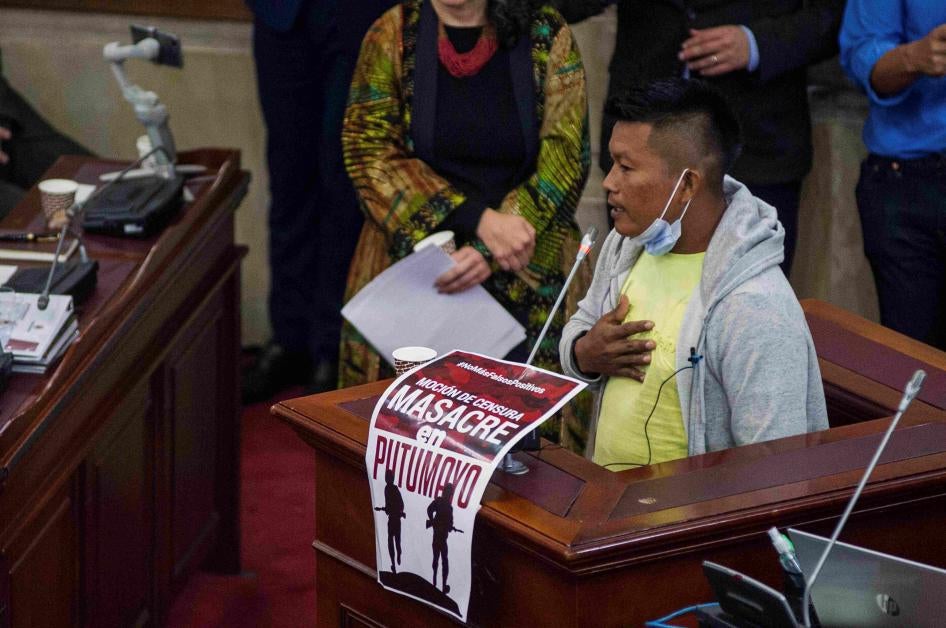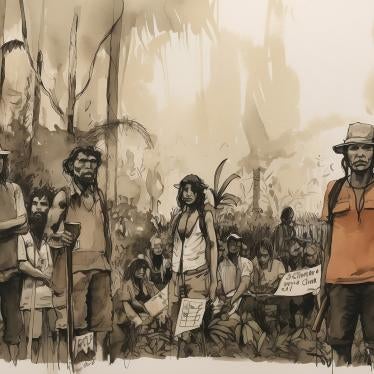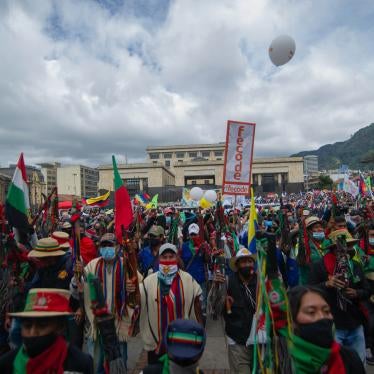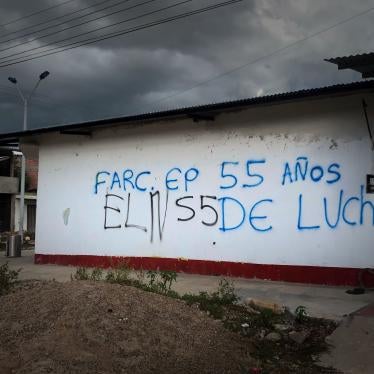(Washington, DC) – Colombian authorities should ensure independent and impartial investigations in cases of soldiers allegedly responsible for killing civilians during a military operation in March 2022, Human Rights Watch said today as it submitted an amicus brief to the country’s Constitutional Court. Human Rights Watch, in the brief, said that the investigation should be carried out in the civilian justice system; not in military courts.
The case concerns a military operation conducted in March 2022, in the town of Alto Remanso, in the southern state of Putumayo that left 11 people dead. The Constitutional Court is analyzing whether the military or the civilian justice system will conduct the investigation. The government of then-President Iván Duque said that the operation complied with international humanitarian law, had targeted an armed group known as Comandos de la Frontera, and all the dead were “criminals.” But journalists and human rights organizations, including Human Rights Watch, found that soldiers killed several civilians and appeared to violate international law.
“Colombian authorities should transfer the case to the ordinary justice system and ensure justice for people in Alto Remaso,” said Juanita Goebertus, Americas director at Human Rights Watch. “Prosecutors should also investigate apparent attempts to cover-up these killings and the government should take serious steps to prevent similar abuses in the future.”
In May, the Attorney General’s Office announced it would charge 25 soldiers in connection with the killings. But before prosecutors brought the charges, the soldiers’ lawyers asked the authorities to transfer the case to the military justice system, triggering the Constitutional Court’s case.
Human Rights Watch visited Putumayo days after the killings, interviewing victims, their relatives, and witnesses; local prosecutors, and other authorities. Human Rights Watch also requested information from the army, reviewed journalists’ notes, and met with the then-head of legal affairs of the Army, Brigadier General Óscar Alexander Tobar.
Armed groups, including Comandos de la Frontera and the Carolina Ramírez Front, operate in large parts of Putumayo, impose their own rules on the civilian population, and commit serious abuses, including child recruitment, forced displacement, and killings. These groups are fueled by illegal economies, particularly production and trafficking of cocaine, which is prevalent in the region.
The Defense Ministry said in a statement that the operation was intended to arrest or kill “Bruno,” one of the commanders of Comandos de la Frontera. However, “Bruno” was not at the community party that the army targeted, prosecutors investigating the case and witnesses said. The army intentionally used lethal force, including snipers, causing the deaths of 11 people, including at least 4 who were not members of the Comandos and were unarmed, Human Rights Watch found.
The then-Minister of Defense Diego Molano said the people killed were “criminals” and “members” of Comandos de la Frontera. Two of the eleven people killed had criminal records unrelated to their alleged membership to Comandos de la Frontera, Human Rights Watch found. Human Rights Watch also identified four of those killed as civilians: Juan Pablo Panduro Coquinche, an Indigenous leader; Oscar Oliva Yela, a farmer; Divier Hernández Rojas, a community leader; and his wife, Ana María Sarrias Barrera, who was pregnant. Five people, including a soldier, were injured.
While some members of Comandos de la Frontera were at the community party, the army’s use of force appeared to be excessive and in violation of international law. The Colombian government said the operation was consistent with international humanitarian law, which is only applicable in armed conflicts.
But the Human Rights Watch analysis raises serious doubts that Comandos de la Frontera are a party to an armed conflict with the government. Consequently, the use of force in this operation should have been governed by international human rights law, including the UN Basic Principles on the Use of Force and Firearms by Law Enforcement Officials, which only allows officers to use intentional lethal force when strictly necessary and unavoidable to protect someone’s life.
To prevent similar abuses in the future, the Colombian government should conduct an urgent assessment to establish whether particular groups are parties to an armed conflict with the Colombian military to determine when the use of offensive military operations under international humanitarian law is appropriate. It should also adopt effective measures to protect the population from all armed groups, Human Rights Watch said.
In the aftermath of the killings, army officers took measures that appeared designed to cover up the operation and limit accountability. The operation took place at 7 a.m., but officers called on investigators from the Technical Investigation Unit (Cuerpo Técnico de Investigación, CTI) – the branch of the Attorney General’s Office charged with providing investigative and forensic support to prosecutors in criminal cases – only around noon.
The unit sent investigators, but soldiers informed them that they were to conduct a “home search” to find and arrest “Bruno” and were only informed of the killings after they had arrived, prosecutors told Human Rights Watch. The investigators did not have a legal order to protect the scene and take the bodies. However, they took photos of the scene, and noted that the bodies had been moved, prosecutors said.
These delays meant that the bodies and other evidence were not protected from tampering or manipulation for approximately 8 hours, until a second group of investigators arrived. The bodies were moved before the investigators arrived, prosecutors told Human Rights Watch, and forensic analysis conducted days later indicated that some had been dragged.
Forensic authorities struggled to conduct necropsies in all the bodies because the local branch of the Institute of Legal Medicine (Instituto de Medicina Legal), a national body charged with conducting forensic analysis, lacked sufficient refrigerators to conserve the bodies and, after so many hours exposed to the elements, some were decomposed, Human Rights Watch found.
Authorities provided inconsistent and at times openly false information of the events in media interviews, as well as during meetings with Human Rights Watch. Then-Minister of Defense Molano tweeted that four people had been arrested during the operation, but prosecutors confirmed that nobody had been detained.
“The Attorney General’s Office should also investigate whether any officials purposedly tried to derail the investigation into these army killings,” Goebertus said. “The authorities should expand the capacity of investigators and forensic bodies in remote areas across Colombia. Their absence facilitates unchecked abuses by armed groups and hampered accountability for these army killings.”








